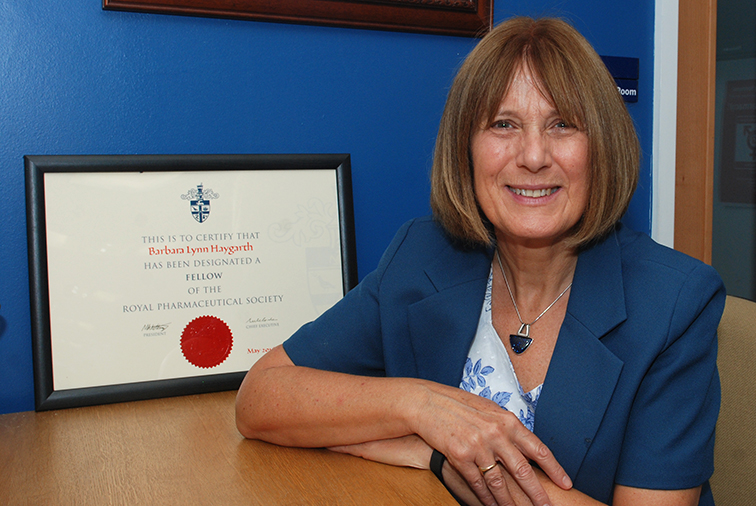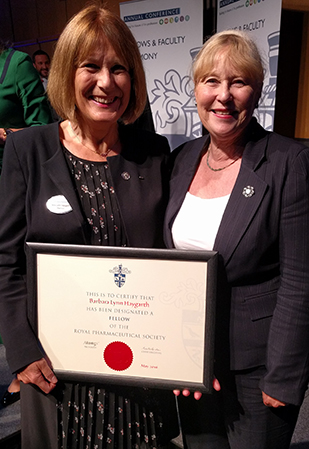Uni’s latest RPS Fellow champions psychiatric pharmacy

Wed, 21 Sep 2016 09:45:00 BST
Lynn Haygarth has lobbied for 40 years to ensure that mental health patients receive the medication and care they need
 ► Lynn Haygarth (left) is pictured with Huddersfield senior lecturer and Past President of the Royal Pharmaceutical Society of Great Britain, Dr Gillian Hawkesworth MBE, after receiving her Fellowship.
► Lynn Haygarth (left) is pictured with Huddersfield senior lecturer and Past President of the Royal Pharmaceutical Society of Great Britain, Dr Gillian Hawkesworth MBE, after receiving her Fellowship.
UNIVERSITY of Huddersfield lecturer Lynn Haygarth, who has played a significant role in boosting the status of psychiatric pharmacy, has been appointed a Fellow of the Royal Pharmaceutical Society (RPS).
She was already a Fellow of the Faculty of the RPS, earned after she submitted a detailed portfolio describing her career and areas of expertise. Now, her full Fellowship of the 175-year-old Society has been conferred, as a mark of her professional prestige, after she was nominated for the distinction. The award was made at the RPS’s annual conference.
The daughter of a community pharmacist in North Wales – “my father would have been jumping for joy at news of the Fellowship,” she said – Lynn Haygarth qualified in 1976. After a decade in community pharmacy, she made a switch to working in a psychiatric hospital, taking her into a speciality that has been a keynote of her career. Her posts have included that of Chief Pharmacist for South-West Yorkshire Mental Health Trust.
She became a Senior Lecturer in Pharmacy Practice at the University of Huddersfield in 2014, and one of her goals is to ensure that students give psychiatric pharmacy the same priority as other branches of the profession.
“They need to know about medicines for schizophrenia, for example, just as much as they need to know about antibiotics or treatment for cardio vascular conditions.”
In the past, said Lynn, mental health was the Cinderella of pharmacy. “When I started, we were always classed as the poor relation in the health service.”
But, she said, mental health pharmacy has special demands, such an ensuring the safety of drug combinations and ensuring that patients – who might not be aware of the seriousness of their illness – adhere to their medication regime.
 Lynn has lobbied for 40 years to ensure that mental health patients receive the medication and care they need. She has witnessed a big change in attitudes, and today’s students are highly receptive to learning about mental health pharmacy, she said.
Lynn has lobbied for 40 years to ensure that mental health patients receive the medication and care they need. She has witnessed a big change in attitudes, and today’s students are highly receptive to learning about mental health pharmacy, she said.
Her experience of the profession means that her role at the University of Huddersfield includes aiding students to find high quality placements. “Also, I can help with CVs because I know what the pharmacy world wants.”
Although she is committed to the continuation of community pharmacies – threatened by proposed Department of Health funding cuts – Lynn acknowledges the importance of major developments in the profession, such as clinical pharmacists, who might undertake medicine review. Students are rising to these challenges, she says.
“Our new generation of pharmacists are really keen to have good patient-facing roles.”







